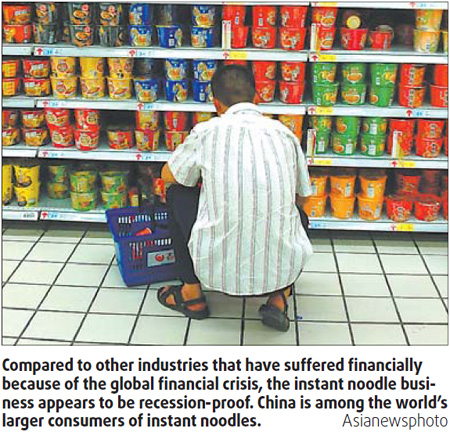
In the competitive instant noodle market dominated by Taiwan's Master Kong and Uni-President Enterprises Corp, it might take some magic for smaller Asian rivals to gain a larger market share.
Perhaps that's why Huafeng recently hired famed magician Liu Qian as its brand spokesman, hoping to boost sales in the country's vast second- and third-tier cities.
However, results won't happen overnight, said Irene Cai, a senior manager with management consulting firm AT Kearney.
Master Kong and Uni-President, along with Hebei Hualong and Sichuan-based Bai Xiang, control more than 60 percent of the instant noodle market.
"For a company without a good distribution network and some brand awareness, it will be a hard job to compete with Master Kong and Uni-President," Cai said.
Market research firm Euromonitor International reported that Ting Hsin International Group, which owns Master Kong, led in domestic market share with 27.2 percent in 2007, followed by Uni-Present with 7 percent. Huafeng, with a 1.3 percent share, was ranked ninth among leading instant noodle makers.
But a fresh new management team has been put in place at Huafeng, which suffered losses from the end of the 1990s through 2004.
"We have adopted a strategy of 'encircle the cities from the rural areas' to gradually improve the market share of our instant noodles in difficult times," said Li Dong, group managing director of Asia Food and Properties Ltd (AFP).
Huafeng is the core food category of Singapore-based AFP, and Li was appointed to head AFP's China business operations in 2004.
"We will consider making inroads into the country's important first-tier cities like Shanghai and Beijing. But before that, we have to establish a solid stance in smaller cities," Li said.
Market conditions in China's first-tier cities have been extremely competitive, dominated by top brands that created barriers to new entries, Li said.
"We decided to start our foray in the second- and third-tier cities, where we deemed it more cost effective from a return-on-investment (ROI) perspective" Li said.
Li said about 60 percent of Huafeng's business is concentrated in North China, and added that more than 70 percent of its business will continue to focus on that market.
Recession-resistant
While the global financial crisis has hit some industries hard, the instant noodle sector is apparently recession-resistant.
"The sales drop in fast food products is not as steep as that of durables, so the instant noodle industry may not be seriously affected by the global financial crisis," said AT Kearney's Cai.
And China is among the largest consumers of the food. A Euromonitor study showed that the consumption of instant noodles has increased significantly since 2003.
The industry has maintained a positive growth rate for five consecutive years, with 69.5 percent sales growth to 59 billion yuan in 2008 - up from 34.8 billion yuan in 2003.
Sales of Huafeng's instant noodles increased 70 percent from $89.28 million in 2006 to $151.92 million last year, according to the company's 2008 financial report.
"Despite the economic downturn, our sales in the first quarter of 2009 increased by 10 percent year-on-year, and we expect to maintain double-digit growth for the whole of 2009," Li said.
Li said the company's production costs also are lower this year due to dropping prices for raw materials such as flour and vegetable oil.
Diversifying the product range and focusing on niche markets also helped Huafeng maintain its profitability, Li said.
Outside the box
Li said the company realized the traditional instant noodle market was approaching saturation, so the company chose a "think outside the box" strategy.
"We invented crispy snack noodles and opened up a brand new niche market where we have a commanding lead over the competition," Li said.
Li said the company's crispy snack noodles carved out a 45 percent market share and remains a leader in this category.
However, AT Kearney's Cai said the lower price point for such products means a 3 percent to 5 percent profit margin -- lower than the profit margin for higher-end instant noodles.
"The high market concentration is the main factor that may constrain the expansion of smaller manufacturers, unless some products with unique features can be developed," Cai said. |